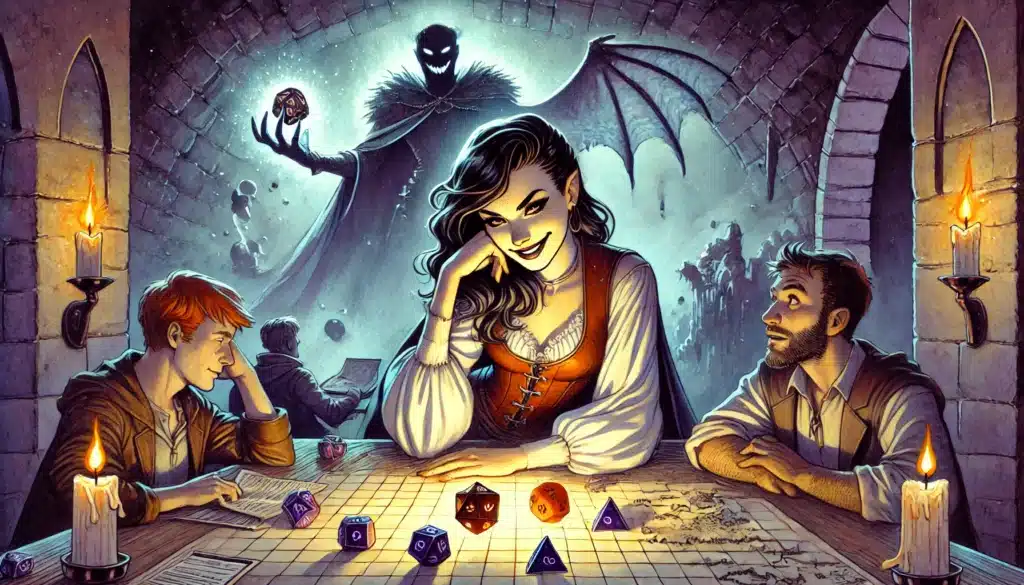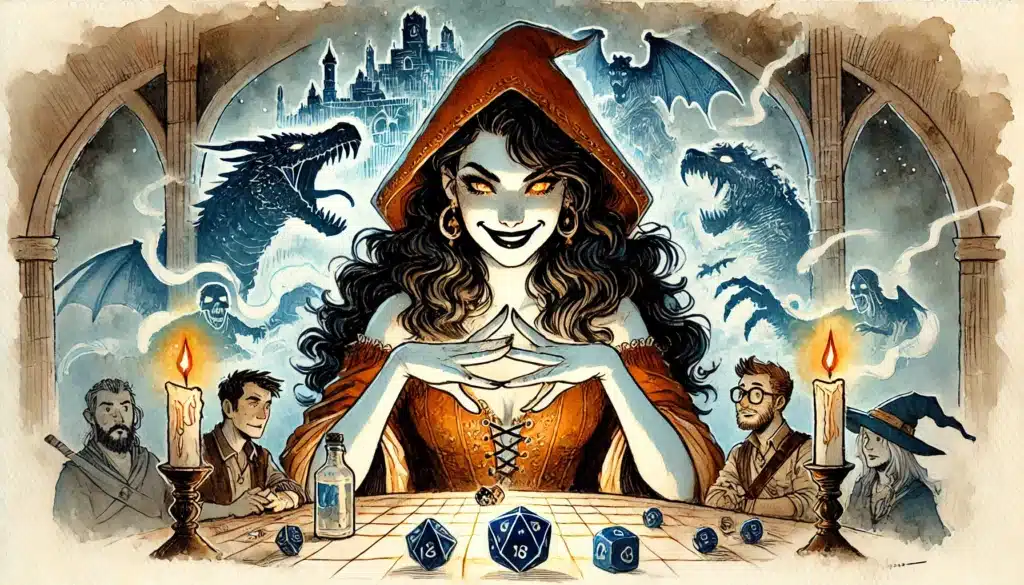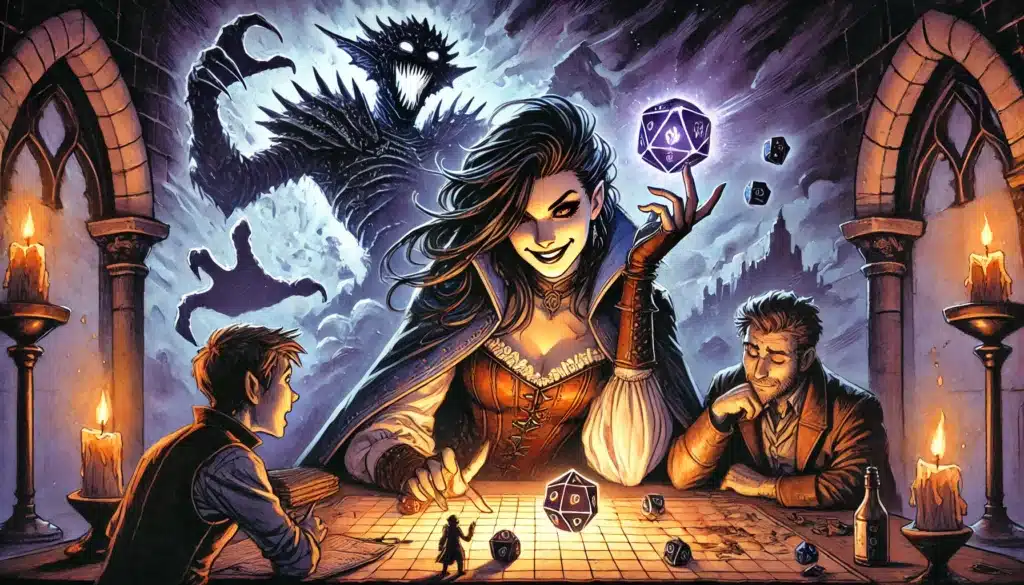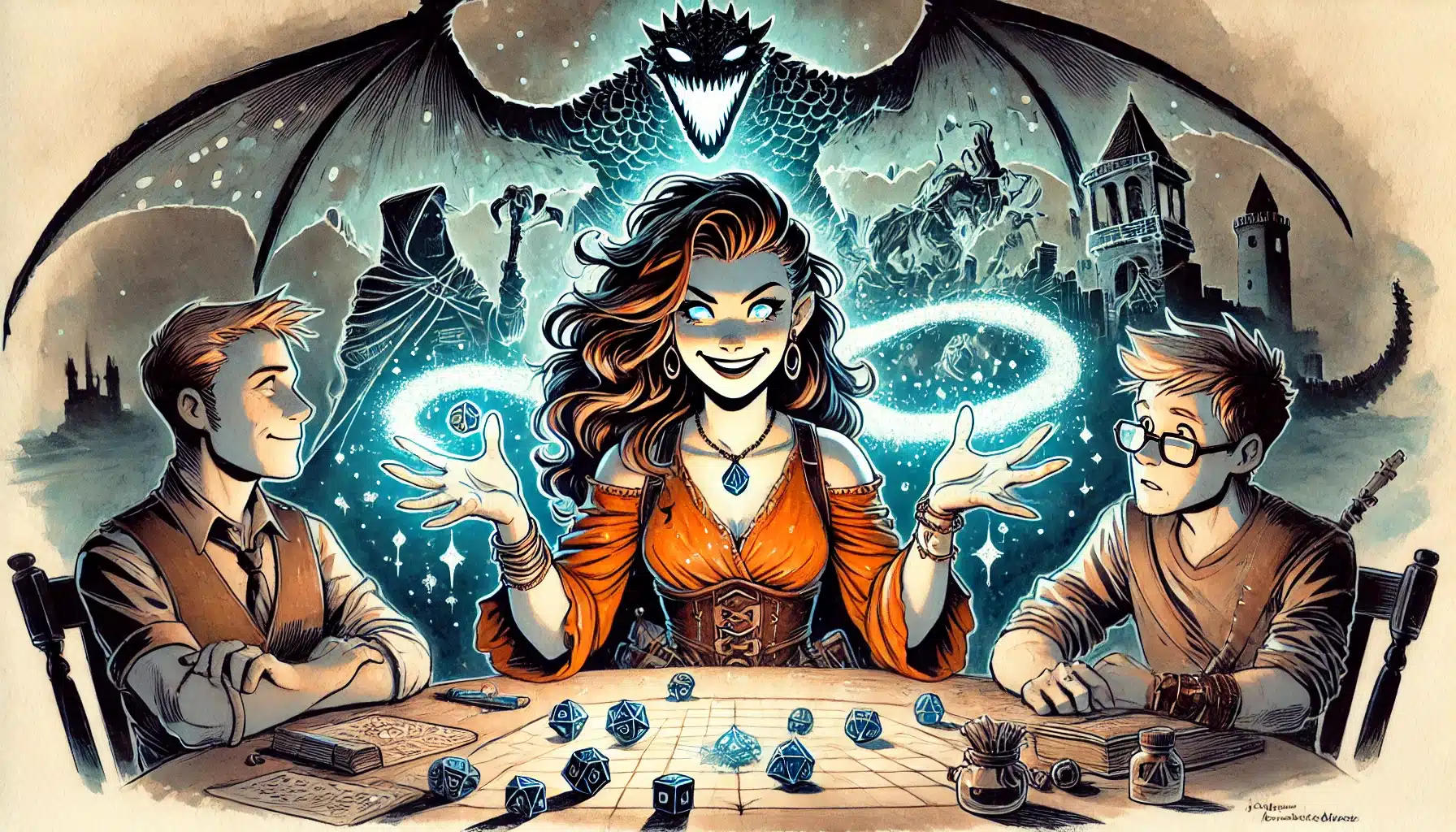Let’s face it: players get the spotlight, the drama, the epic moments, the cheers when their cunning plans work or wild dice rolls deliver miracles. They weave deeply personal stories, agonize over backstories, and fall in love with their characters’ flaws. But behind every legendary quest, spine-tingling twist, or demon-haunted tavern, there’s a Dungeon Master quietly pulling strings and conjuring worlds from thin air. If being a player is exhilarating, being the DM is transcendent.
DMing isn’t just about telling everyone what the goblins do next. It’s an invitation into a vast playground of possibilities, where every wild idea, passing whim, or midnight inspiration can manifest with a stroke of your pen. Sure, you carry the invisible backpack of responsibility: prepping sessions, tracking NPC motivations, ensuring everyone’s included, and solving rules disputes. But within that weight lies the exhilarating freedom to flex every creative and social muscle you possess.
This is not to overlook the challenges. DMing can mean late nights, balancing spotlight time, or taking the blame for a botched scene. It’s work—but work laced with pure creative adrenaline. The payoff is an experience richer, deeper, and more versatile than anything a single character’s journey can offer.
So, let’s celebrate the unique, electrifying joys of being a DM. From the absolute sovereignty over setting and story, to the intimate, shape-shifting connection you forge with your players, here are seven reasons why DMing DnD doesn’t just match the fun of playing—it far surpasses it.
- DMing Lets You Create Worlds, Not Just Characters
- You Control the Pace and Flow of the Game
- DMing Gives You All the Characters
- The Satisfaction of Setting Up Payoff
- You Can Shape the Game to Fit the Table
- DMing Can Be the Ultimate Creative Outlet
- Watching Your Players Thrive Is the Best Reward
- Final Thoughts on Why DMing Might Be Better
DMing Lets You Create Worlds, Not Just Characters
The player’s role is intimate, often laser-focused: a single soul, a lone perspective, walking through the world brick by imagined brick. But DMs? DMs are the architects, the ones who shape the very bricks themselves. You answer not just “Who am I?” but “What is this place, really?” Each session is a chance to dream up lost continents, eerie magics, or bizarre rituals and then—luxuriously—watch as your players race to uncover (or upend) them.
Worldbuilding is a heady cocktail of power and possibility. One night you’re sketching out a glimmering city on a flying island; the next, you’re inventing a new calendar system or deciding which mushroom makes orcs hallucinate. Every minor mystery, every obscure holiday can become a springboard for adventure. The rules of reality itself bend for you: pantheons multiply, folklore creeps into architecture, and haunted legends flicker in torchlight, all because you say so.
Try my AI Tabletop RPG generators...and an extensive library of content!
And it’s not just set dressing. Everything you craft—a city’s politics, a cult’s forbidden doctrine, the secret history buried beneath a tavern—creates living, reactive opportunities for your players. Worldbuilding as a DM isn’t just background noise. It’s the heartbeat of the campaign, pulsing with secrets only you know and stories waiting to be told.
Ten Things Only DMs Get to Create:
- Entire pantheons of gods and their feuding offspring
- Magical economies with whimsical currencies (mermaid pearls, enchanted feathers)
- Forgotten ruins with shifting staircases and ghostly echoes
- Rival adventuring parties with dark mirrors to your own
- Ancient curses that bend fate itself
- Political intrigue among city-states, guilds, or monstrous clans
- Secret societies and mysterious symbols carved into hidden places
- Wild magic storms that rewrite the laws of physics for a day
- Regional dishes, festivals, and superstitions unique to each village
- Lost languages or dialects only spoken by certain races or monsters
- Mythical beasts no monster manual dares describe
- Custom artifacts with powers tied to campaign mythology
- Weather patterns, flora, and fauna that shape daily life
- Ancient wars and legendary heroes that color every conversation
There’s a special, chest-swelling satisfaction in watching players uncover your secrets, flinch at your storms, or debate the intent of the sigils you scattered in the catacombs. As a DM, your fingerprints are everywhere. The world lives, breathes, and mutates—not because it was written in a book, but because you willed it into being.
When players gasp at a twist, break into delighted argument over your invented festival, or rally together against a threat you alone created, that’s DM alchemy at work. There’s no rush quite like seeing your ideas become the canvas and crucible for someone else’s adventure.

You Control the Pace and Flow of the Game
Ever felt boxed in by initiative order, staring at your character sheet while someone else’s conversation drags? Players are passengers on the wild, wonderful ride, but the DM is the conductor checking the speed, setting the mood, and deciding exactly where the sharp corners lurk.
⚔️ Fantasy RPG Random Tables Books
Make life as a Gamemaster easier…
If you play Dungeons & Dragons, Pathfinder, or other fantasy RPGs, this
RPG random tables series
is packed with encounters, NPCs, treasure, and more. Available in eBook or print—either way, you’ll have a wealth of adventure ideas at your fingertips.
As a DM, you hold the tempo. Is tonight a breathless dungeon dive, a tense mystery, or a relaxed tavern crawl? You can crank up the adrenaline with surprise attacks or slow things down for deep character moments. If a moment’s dragging, you skip ahead; if the table’s roaring with laughter, you let it breathe. Players, for all their momentum, move at the DM’s pace—and good DMs know how to make every minute count.
Your narrative scissors are sharp: want to cut to the next morning, montage through weeks of travel, or slam the door shut with a cliffhanger? That’s yours to decide. When the party’s about to split, you give just enough rope; when every eye is wild with anticipation, you decide when the tension breaks.
How DMs Manage the Pacing:
- Ending sessions on jaw-dropping cliffhangers
- Fast-forwarding through uneventful travel (with or without montages)
- Skipping random encounters that don’t add to the story
- Pausing for spotlight moments when a player’s big arc comes up
- Cutting away to show what the villains are plotting
- Compressing large-scale battles to a few high-stakes rolls
- Zipping ahead to “the next morning” after downtime
- Expanding tense moments with vivid, slow-motion descriptions
- Layering dramatic silence before a reveal or betrayal
- Interrupting with environmental events—sudden storms, earthquakes, parades
- Letting players roleplay or strategize as long as the creative energy is flowing
- Seamlessly transitioning between scenes or locations
- Refocusing the group when conversation drifts
When you can sweep away the sluggish parts and accelerate towards the good stuff, you become the guardian of everyone’s time and enjoyment. That ability to shape the tempo means you can banish boredom and keep the table glued to your every word.
Ultimately, this control isn’t about power—it’s about keeping the game electric. It means you’re free to chase excitement, to follow character drama, and to make sure your campaign always feels fresh. Players might drive the action in-character, but it’s your pacing that keeps the story moving, memorable, and (most importantly) fun.

DMing Gives You All the Characters
Why settle for just one hero or villain sweeping across the stage, when you can inhabit an entire cast of souls, each with bristling secrets and shifting allegiances? DMing is like having an infinite mask collection. In a single session, you might be a bandit queen, an unctuous merchant, a haunted specter, or even the voice of a mad god.
You’re not just voicing lines; you’re constantly improvising, stretching your empathy, and flipping between personas. Players come to know your shopkeepers, your mischievous goblin twins, your melancholy knights—not just as quest-givers, but as characters that feel as dimensional as any PC. The sheer variety keeps you sharp, inventive, and always on your toes.
This role is improvisational theater to the max. Will a player charm your ogre brute into joining the party? Will someone flirt with a demure librarian for a dusty clue? Even you can be surprised by your creations’ reactions, because the world is always evolving—thanks to the chemistry at the table.
| NPC Role | Personality Type | Players Typically Engage As |
|---|---|---|
| Quest Giver | Wise and mysterious | Seeker / Information source |
| Villain | Charismatic and cruel | Adversary / Foil |
| Merchant | Greedy but charming | Negotiator / Ally |
| Mentor | Stern yet caring | Guide / Advisor |
| Rival Adventurer | Cocky and competitive | Competitor / Frenemy |
| Comic Relief NPC | Clueless and bumbling | Source of Humor / Distraction |
Let’s be honest: nobody else gets quite as deep into roleplay as the DM. You’re switching hats mid-scene, experimenting with accents, letting NPCs develop unexpected relationships with the party (and each other). You’re the glue that holds the narrative tapestry together, the heartbeat behind every face in the world.
When a table full of players—veterans and newcomers alike—respond to your stable of characters, you realize DMing is the largest, wildest acting role in the game. If you love drama, humor, and constant surprise, why settle for only one character?
The Satisfaction of Setting Up Payoff
Players get the thrill of discovery, but DMs get the deeper thrill of creation ripening into surprise. Every cryptic clue, every odd foreshadowing, every detail dropped in passing can blossom into a full-blown payoff weeks or months later if you’re clever and a little bit patient.
Building layered story arcs and planting narrative seeds is DM magic. Maybe you hinted at a forgotten god through a cryptic omen, or slipped the villain’s symbol onto a dusty locket. When these breadcrumbs eventually come together—the prophecy breaks, the traitor is unmasked, the party finds the forbidden door—you’re at the helm of every “aha!” and “wait, what?!” at the table.
⚔️ Fantasy RPG Random Tables Books
Make life as a Gamemaster easier…
If you play Dungeons & Dragons, Pathfinder, or other fantasy RPGs, this
RPG random tables series
is packed with encounters, NPCs, treasure, and more. Available in eBook or print—either way, you’ll have a wealth of adventure ideas at your fingertips.
Players react; DMs orchestrate. That difference isn’t about taking away agency, it’s about creating the conditions for agency to matter. Watching the dominoes you set up eventually topple gives you a connection to the campaign that’s both cerebral and emotional—a long game of anticipation and payoff.
Killer Narrative Payoffs Only DMs Get:
- Witnessing a prophecy unfold just as the players realize its meaning
- Revealing the hidden villain they trusted for months
- Bringing an innocuous NPC back as a secret big bad
- Having a player’s tragic backstory dovetail perfectly with the main plot
- Finally unveiling a secret room or artifact after 10 sessions of teasing
- Rewarding players with story-altering boons for clever decisions
- Revealing the consequences of past choices with unexpected twists
- Wrapping up interwoven arcs in a jaw-dropping finale
- Watching players piece together clues from multiple sessions
- The surprise on their faces when they realize “the rules” were bent for narrative effect
There’s a high, almost like being a stage magician, when you see your players gasp, cheer, or even groan with delight at a payoff you planted sessions ago. Their excitement is the mirror to your master plan—and the grin you’re hiding is well-earned.
This long-game storytelling, unique to DMing, fuels the sort of in-jokes, tales, and “remember when?” moments that stick with players for years. It’s satisfaction, drawn out and amplified, that you just can’t get by playing a single character.
You Can Shape the Game to Fit the Table
Every group is a little different—the power gamer who loves tactics, the actor who craves drama, the puzzle fanatic that lights up at riddles. Only the DM has the power to sense the pulse of the table and subtly pivot the campaign to amplify what people love while softening what they don’t.
You’re the ultimate audience-reader, tweaking mechanics and story on the fly. If the players are tired, you can shorten the session or lighten the tone. If they want challenge, you pull out a tougher boss fight. From rules enforcement to thematic pacing, you have unprecedented freedom to match the experience to the room, not just the rulebook.
This goes deeper than encounter balance or plot forks. Want to try a house rule? Focus on collaborative storytelling over combat? Pivot the entire vibe mid-campaign from gothic horror to wild farce? The DM is the tuning fork, making sure the song stays sweet and electric.
Ways DMs Adapt the Game:
- Adjusting the difficulty of encounters in real time
- Dropping or modifying rules to fit table agreement
- Shifting session length based on group energy
- Embracing player-led storylines or spontaneous decisions
- Changing the tone—from grimdark to lighthearted as needed
- Tailoring rewards and loot to motivate different players
- Varying combat versus narrative focus
- Rearranging upcoming content to suit group interests
- Replacing problematic content with more inclusive storylines
- Weaving in character backstory for deeper engagement
- Letting players co-create new locations or factions
- Offering alternative victory conditions for clever play
- Running one-on-one side quests to suit individual schedules
No other seat at the table is as directly responsive. Where players can only react, the DM can proactively smooth rough spots, stoke excitement, or steer clear of content no one’s vibing with. That flexibility is the real secret sauce—turning even a “bad night” into a memory worth savoring.
It’s in these adaptive moments—when you see your players light up, relax, or high-five each other—that the secret power of DMing is laid bare. You become not just a storyteller, but a facilitator of fun, growth, and unforgettable group experiences.
Try my AI Tabletop RPG generators...and an extensive library of content!
DMing Can Be the Ultimate Creative Outlet
DMing scratches so many creative itches—sometimes all in a single session. One moment you’re a GM, the next you’re a mapmaker, a puzzle designer, a tactician, or an improv actor. The skills you exercise as DM don’t just shape the game—they hone your real-world creativity in ways that ripple well beyond the table.
Every session blends all the art forms: storytelling, visual design, problem solving, public speaking, group psychology, and acting. When you prep a dungeon or invent a new challenge, you’re not just making next week’s session possible—you’re flexing muscles that writers, designers, teachers, and strategists use in the wild.
And the reward isn’t just the satisfaction of a well-run game. It’s the sense of creative confidence you carry into new projects, hobbies, or even your job. DMing is a living, evolving experiment, and each campaign makes you better at invention, adaptation, and collaboration.
| D&D Creative Task | Real-World Skill It Exercises | Why It Feels Rewarding |
|---|---|---|
| Map Drawing | Visual design, spatial logic | Making a tangible artifact for play |
| NPC Voicing | Acting, public speaking | Seeing players react to your characters |
| Puzzle Design | Problem-solving, logic | Stumping and thrilling your players |
| Encounter Balancing | Game theory, mathematics | Crafting tension and challenge |
| Lore Writing | Creative writing, worldbuilding | Deepening the immersion of your world |
DMing is a creative fever dream in the best possible sense. Every note you take, voice you mimic, or wild scenario you invent is an investment in your creative future—skills that feel less like work and more like play.
And over time, you can see yourself changing—becoming more fearless, more inventive, more comfortable collaborating and improvising. DMing is not just making everyone else’s night better; it’s making you a more creative and resilient human along the way.
Watching Your Players Thrive Is the Best Reward
If there’s a single, radiant heart to being a DM, it’s this: you get a box seat for every epic triumph, heart-wrenching failure, wild plan, and group in-joke your friends dream up. There’s a rare beauty in helping someone else shine—and in DMing, that beauty is on display every game night.
You’re not just crafting plot twists or describing ancient crypts. You’re facilitating catharsis, drama, laughter, and wild, unforgettable memories. When the party pulls off a seemingly impossible win or roleplays a heartbreaking goodbye, you feel that satisfaction deeper than any solo accomplishment.
You get a vicarious stake in every victory. Some sessions, your players’ cleverness outwits you, and it’s glorious. Other nights, you see shy friends blossom, or old hands try new things. These moments aren’t just “nice to witness”—they’re the reason the game has stuck around for decades.
Magical Moments Only DMs Witness:
- A critical success that saves the whole party at the last second
- Players solving a riddle you thought was too tough
- The moment a player’s arc gets a satisfying resolution
- Unscripted heroism or self-sacrifice for a friend
- Genuine emotion—sometimes tears—during deep roleplay
- Epic failures twisted into legendary running jokes
- Shy or new players stepping into the spotlight
- PCs working together on a plan that stuns even you
- Delighted screams at a wild, unexpected twist
- Out-of-game friendships deepening through shared experience
- When an in-game joke spills into real life and becomes legend
- Watching players connect their backstories to the main plot
In these moments, your effort blooms into something bigger than a game. You become the keeper of memories, the silent architect behind a string of magical nights. The emotional wealth you gather as a DM can outweigh any rulebook headache or chaos management.
That’s why, despite the challenges, the sense of meaning and togetherness you foster at the table is unmatched. It’s not about being the boss—it’s about being the enabler of adventure, the one who hands everyone else the keys and cheers as they soar.

Final Thoughts on Why DMing Might Be Better
When you weigh the scales—worldbuilding versus character focus, creative control versus reactive play, the power to adapt on the fly versus following a track—the DM’s role comes up rich, nuanced, and ceaselessly satisfying. Yes, players get hero moments, but DMs conjure the entire playground those moments happen in. Yes, there’s work and pressure and rules-wrangling, but the sense of ownership, artistry, and emotional connection is unparalleled.
Running the game lets you dip into all the disciplines: improv, acting, storytelling, game design, conflict resolution, and hospitality. You have the power to shape every facet of the experience, from the tension of a chase to the tears in a finale. Sometimes you’re the puppet master, other times the cheerleader, but always, you’re the crucible where group chemistry turns into lifelong memories.
Maybe you’ve always hesitated to give DMing a shot, daunted by the invisible workload or worried you’ll fall short. My advice: try a one-shot, or share the role in a co-DM campaign. Give yourself permission to experiment. The unique flavor of creativity and camaraderie you’ll discover is worth every ounce of effort.
Both roles—DM and player—are essential, and each is its own kind of magic. But DMing is a craft, a performance, and an act of friendship all at once. The table is your stage, and every adventure is a chance to create something unforgettable. If you’re craving a deeper, richer connection to the game and your friends, step behind the screen. You might find it’s the role you were born to play.










